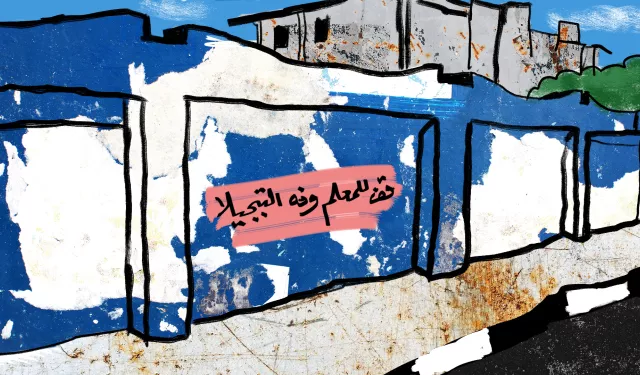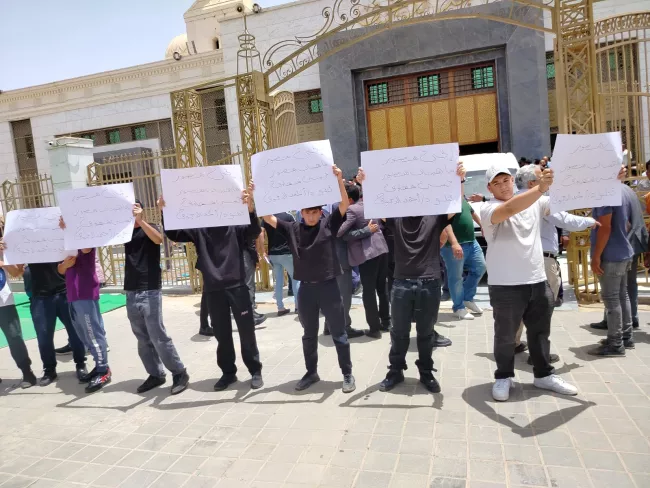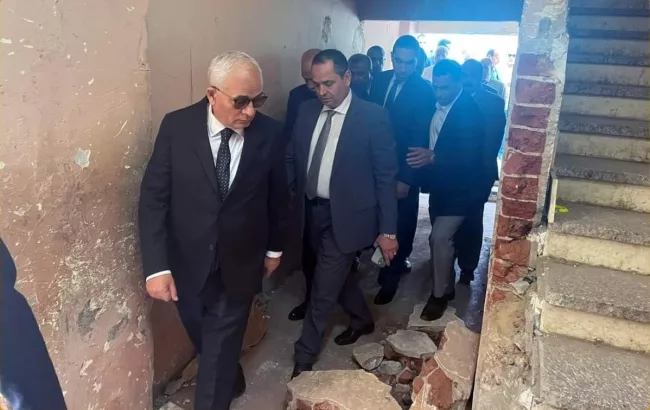
Mama Nawal and the bloody business of education
As soon as Mama Nawal El Degwi’s treasure trove burst open, unleashing its hoarded contents, it felt as if a surgeon’s scalpel had finally pierced an abscess long left to fester. The result? A surge of pus and rage.
Between mouths agape asking indignantly, “How much is she hiding at home?” and lofty proclamations urging virtue and acceptance of divine providence—“Don’t be envious, leave people alone”—a flood of misplaced wisdom and sermons ensued. Meanwhile, speculation swirled around the staggering fortune that could turn a child’s hair gray, and updates poured in on the death—whether by murder or suicide—of the grandson who had been demanding his controversial “share.”
But for who might be asking, what exactly happened? Here’s the story that stunned the country.
In early 2025, Egyptian media exploded with the saga of Nawal El Degwi, a 90-something businesswoman revered as a pioneer in private education and the founder of MSA University. The story began when El Degwi filed a dramatic police report accusing two of her grandsons, Ahmed and Amr, of stealing what was described as a “treasure” from her private villa. This wasn’t a metaphor.
The report claimed the stolen assets included 3 million US dollars, 350,000 British pounds, 15 kilograms of pure gold, and 50 million Egyptian pounds—all allegedly stored in the house. That single complaint revealed a staggering personal fortune totalling around 300 million Egyptian pounds (about $5.8 million USD at the time), prompting public disbelief and endless questions. How could such unimaginable wealth be stored in a single villa? And how did it accumulate?
What began as a theft allegation quickly spiraled into a full-blown family feud. More than 40 lawsuits were filed between relatives. Amr, one of the grandsons, even petitioned the court to strip El Degwi of control over her assets, claiming she was mentally unfit to manage her empire due to her age. El Degwi, known for her sharp mind and formidable reputation, appeared in court to assert her full mental competence. The court dismissed the case, but tensions continued.
Then came the tragedy. In May 2025, Ahmed El Degwi, the other grandson accused in the theft report, was found dead of a gunshot in his villa. While authorities suggested suicide driven by mental health struggles, his brother publicly rejected condolences, hinting at foul play.
As the family dispute dragged on, its scope widened beyond cash and gold to include control of key institutions like MSA University and Dar El-Tarbiah schools—a vast education empire. Public curiosity intensified as more revelations surfaced: this wasn’t just a squabble over inheritance—it was a battle over billions of Egyptian pounds.
One particularly staggering detail emerged in court documents: a single check worth over 160 million pounds (around $3 million) had become a point of contention between family members. To put that in perspective, the minimum wage in Egypt is just 7,000 pounds a month (nearly USD 140), and 32.5% of Egyptians live below the poverty line.
This is movie stuff. A screenplay, ready for any writer to drop into a movie or melodramatic TV series. To anyone unfamiliar with the tale of Mama Nawal, it might seem like pure fantasy.
But what I saw was a story about the decay of Egyptian education, which once was a right for all like water and air but has now devolved into bloodshed over billions. I don’t know Nawal or her children or grandchildren, nor do I care to. But they are a glaring example of how education has been hijacked, commodified, and repurposed to feed an insatiable appetite for wealth.
I have many stories to tell about the evolution of education in Egypt—its pioneers, its nationalization, and its eventual privatization. But I’ll save that for another time. For now, I’ll address those calling for an end to “class envy” and urging us not to “covet other people’s blessings.” Some say, “Of course she has this money—she’s been working for 70 years!”
But is education really a legitimate path to amass billions—framed as “honest earnings”? How many citizens have worked for 70 years, with dedication and perseverance like Mama Nawal, and managed to accumulate even a quarter of her fortune? Are we truly envious, or merely scrutinizing the sources of wealth amassed by Mama Nawal and others icons of private education like her? And is it even appropriate to refer to those profiting from the future of our youth as “pioneers”?
Profit—and the crime of pursuing it
Egypt’s 2009 Private Universities Law explicitly states that private universities are not meant to be profit-driven. It also prohibits nonprofit universities from operating with profit as a goal. Despite the problematic distinction between private and nonprofit institutions, the law as it stands does not allow anyone to rake in billions from education.
According to the law, the primary purpose of private or nonprofit universities is to provide and develop scientific services that contribute to education, research, and community development.
And let’s be honest: in a country where a third of the population lives in multidimensional poverty, such services do not generate billionaire wealth—especially when the law permits donations and regulates them specifically to support education, not to help anyone land on the Forbes list.
The Ministry of Higher Education is supposed to audit university budgets to ensure that tuition fees are being properly spent on actual education.
Simple math tells us that if the law was applied both in letter and spirit, these university owners would not be bloated with wealth. Tuition fees should largely go towards improving the educational process. Sure, the law doesn’t specify a profit margin—a flaw I hope will be corrected—but it’s safe to assume that parents pay these exorbitant fees expecting top-quality education. Instead, we get widespread private tutoring even within private universities.
So what’s the problem, exactly?
The problem is... we’re in Egypt—a third-world Arab-African country where over a third of the population lives in monetary poverty, and another third lives in multidimensional poverty, deprived of essential services. As of March 2024, the illiteracy rate stands at 16%, and only 37% of Egyptians receive university education, according to the Central Agency for Public Mobilization and Statistics.
The infrastructure and public services are woefully inadequate. I remember teaching in a literacy campaign for girls in an informal settlement. Some had completed middle school in public schools but couldn’t write more than their names—and even that with mistakes.
A country like this cannot afford to leave educational ventures to operate freely as investment schemes trafficking in children’s futures. The wealth amassed from this “business” is not “honest income.” And even if we accept that profit can be made in this sector, returns of 500 or 600% are indefensible.
The teacher’s hand in every pocket
The education sector is, by nature, a service sector. It doesn’t produce an exportable good, generate foreign currency, or boost the stock market. Its revenues come solely from the pockets of ordinary Egyptians—people who work long hours, or part from their families to work abroad just to secure a decent education and humane healthcare for their children.
And yet, private institutions barely spend a quarter of what they collect on actual education. If they were even spending half and profiting from the rest, we wouldn’t see such astronomical fortunes.
We are not a country with a conducive investment climate. Even in first-world countries, where billionaires emerge from cosmetics, hotels, or even stationery, we’ve never heard of a teacher making it onto the rich list by running a school chain—despite having private education sectors.
Education projects are meant to serve the public, not earn money from the public. It is unethical, inappropriate, and simply outrageous to become a billionaire from the pockets of the people. Education is supposed to uplift everyone—not be a genie’s lamp for the lucky few.
The state must not only ensure that parents’ money translates into quality education but must also directly regulate educational costs, set rational profit margins, and protect families from financial exploitation. Public education must be improved, and progressive taxation imposed to match each citizen’s income.
The billions behind the curtain
Let’s not forget that Mama Nawal, who never earned a doctorate, began her career collecting donations through Laylat al-Qadr fundraising campaigns run by Akhbar Al-Youm. She was even granted a state-owned villa—public property—for a charitable daycare project meant to support working mothers, at a nominal fee.
How did a charity project, launched with donations and public assets, morph into a multi-billion-pound empire now embroiled in inheritance disputes?
This speaks to the moral collapse of our society—where citizens, seeking to appear virtuous, end up defending corruption and profiteering off public resources. They urge others to “live and let live,” completely unaware of the difference between accountability and envy. They quote tired maxims—“Leave people alone, it’s their livelihood... She’s a pioneer of private education... Go pick on the actors and dancers instead... ninininini.”
No, my self-righteous friend, you’ve got it all wrong.
Actors, singers, and dancers are paid by producers who profit from their work. The platforms and websites broadcasting their content make money from corporate advertisers. You, the viewer, pay only with your time.
Of course, this capitalist system has its flaws—it affects content quality and substance—but it doesn’t reach directly into your wallet. And entertainment is, after all, dispensable.
Education isn’t. It’s a fundamental human right. You can’t opt out of it. And the money it generates comes only from you.
So if you're confused about what’s acceptable and what’s not—about when to question and when to stay silent—perhaps it’s time you reexamined your values.
Published opinions reflect the views of its authors, not necessarily those of Al Manassa.


